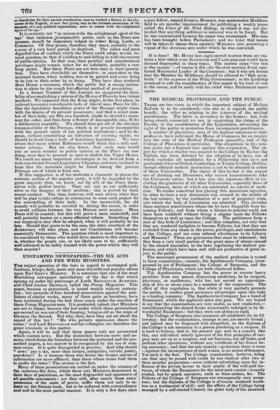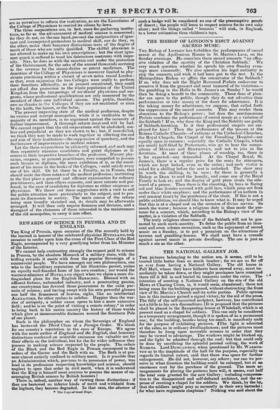THE MEDICAL PROFESSION, AND THE PUBLIC.
THERE are two views in which the important subject of Medical Reform is to be considered,—the one as it regards the public benefit ; the other as relating to the interests of the medical practitioners. The latter is secondary to the former ; but, both being closely connected, we are, in supporting the claims of the Faculty to the consideration of the Legislature, advocating the right of the public to protection from incompetent practitioners.
A number of physicians, men of the highest eminence in their profession, have petitioned the House of Commons for an inquiry into the state of the Medical Profession generally, and of the College of Physicians in particular. The allegations in this peti- tion make out a flagrant case against this corporation. The ob- ject for which a charter was granted to the College by HENRY the Eighth, has been defeated by the adoption of by-laws, one of which excludes all candidates for a Fellowship who have not graduated either at Oxford, Cambridge, or Trinity College, Dublin; though efficient medical instruction is not to be obtained at either of these Universities. The object of this by-law is the unjust one of shutting out Dissenters, who cannot conscientiously take the University oaths; but it has also the injurious effect of ex- cluding the graduates of all other Universities, especially those of the Continent, many of which are celebrated as schools of medi- cine. To render somewhat less glaring this monstrous injustice, by other by-laws a new distinction was created in the middle of the last century, by the institution of a sort of purgatory state, into which the body of Licentiates are admitted. This includes those eminent practitioners whom the by-laws disqualify from be- coming Fellows; and from whom a licence to practise could not have been withheld without fixing a stigma upon the Fellows themselves as well as upon the College. The petitioners form a part of this body of Licentiates ; and they complain, not only that they are rendered ineligible to become Fellows, but that they are excluded from any share in the power, privileges, and emoluments of the College, and are even refused admittance to its Library and Museum! These are grievances that must be redressed; but they form a very small portion of the great mass of abuses caused by the absurd anomalies in the laws regulating the medical pro- fession, and which have been and still are productive of great in- jury to the public.
The municipal government of the medical profession is vested in three corporations,—namely, the Apothecaries Company, incor- porated by act of Parliament; the College of Surgeons, and the College of Physicians, which are both chartered bodies. The Apothecaries Company has the power to recover heavy penalties from any person dispensing medicines, be he surgeon, physician, or apothecary, who has not served an apprentice- ship of five or seven years to a member of the corporation. The effect of this regulation is, that while it very partially protects the public, it confers great pecuniary advantages upon this body as a trading company. The Apothecaries Company has a board of Examiners, which the applicant mast also pass. We are bound to say that the examinations are very useful, as now conducted,— notwithstanding the absurd freaks occasionally indulged in by th worshipful Examiners : but they were not always so rigid. The College of Surgeons also examines all candidates for its fel- lowship : but the examinations, strange to say, are merely formal ; and indeed may be dispensed with altogether, as the diploma of the College is not necessary to a person practising as a surgeon. It is hard to believe, that in the present age and in a country like this, any individual utterly ignorant of the first principles of sur- gery may set up as a surgeon, and set fractures, cut off limbs, and perform other operations, without any certificate of his fitness be- ing necessary; and that the only remedy—protection there is none —against the incompetence of such a man, is an action of damages. Yet such is the fact. The College examination, however, being one that may be passed with credit by any student after two or three months' preparation—even without calculating upon the in- fluence of the private favour to their pupils of the well-paid turers, of whom the Examiners for the most part consist—is rarely evaded, but by quack operators, such as bone-setters, &c. The
Fellows of the College of Surgeons-are consequently very nume- rous; but the diploma of the College is of course rendered worth- less as a testimonial of skill; and the affairs of the College being managed by a self-elected Council, the great body of the members are as powerless to reform the institution, as are the Licentiates of the College of Physicians to rescind its odious by-laws. The three -corporations are, in fact, mere fee-gathering institu- tions, as thr as the advancement of medical science is concerned; for they do not, on the one hand, prevent the malpractices of igno- rant and incompetent pretenders to medical skill, nor do they, on the other, make their honorary distinctions tests of the degree of merit of those who are really qualified. The skilful physician is not allowed to make up his own prescriptions; but the most igno- rant quack is suffered to- vend his deleterious nostrums with impu- nity. Nay, he does so with the sanction and under the protection of the Government, for the sake of the annual thousands accruing to the revenue by the stamp-duties on patent medicines. The dominion of the College of Physicians is moreover limited to phy- sicians practising within a circuit of seven miles round London : so that, even supposing the two Colleges were really to perform their functions efficiently, as at present constituted, they could not afford due protection to the whole population of the United Kingdom from the tamperings of soi-disant physicians and sur- geons, whose professional qualifications are only measured by the standard of their own individual opinion. The public, therefore, owe no thanks to the Colleges if they are not mutilated or slain by the knife, the lancet, or the bolus. The present improving state of the medical profession, despite its vicious and corrupt monopolies, while it is creditable to the majority of its members, is no argument against the necessity of further improvement. A thorough reform must and will be had. We cannot expect that the old corporations will be abolished, use- less and prejudicial as they are shown to be; but, if remodelled, we think they may be made to work together in effecting the end and aim of their institution—the suppression of quackery, and the furtherance of improvements in medical science. Let the three corporations be efficiently- reformed, and each may then separately examine candidates and grant diplomas or li- cences in their respective branches of the profession. 'revery phy- sician, surgeon, or general practitioner, were compelled to possess such licence or diploma, the mere exhibition of it, or the enrol- ment of his name in the books of the Colleges, a ould satisfy every one of his skill. Or let there be a Faculty, as in France, that should unite the three estates of the medical profession; instituting in the first place a general and efficient examination for ordinary practitioners, and then others separate, and more minute and pro- found, in the case of candidates for diplomas as either surgeons or physicians. We throw out these suggestions with a view to call the public attention more particularly to the subject, and to pro- mote its discussion in society. The main course of the reform being once broadly sketched out, its details may be afterwards arranged. It will then only require firmness and decision, and a disregard of the clamours of those interested in the maintenance of the old monopolies, to carry it into effect.



















 Previous page
Previous page